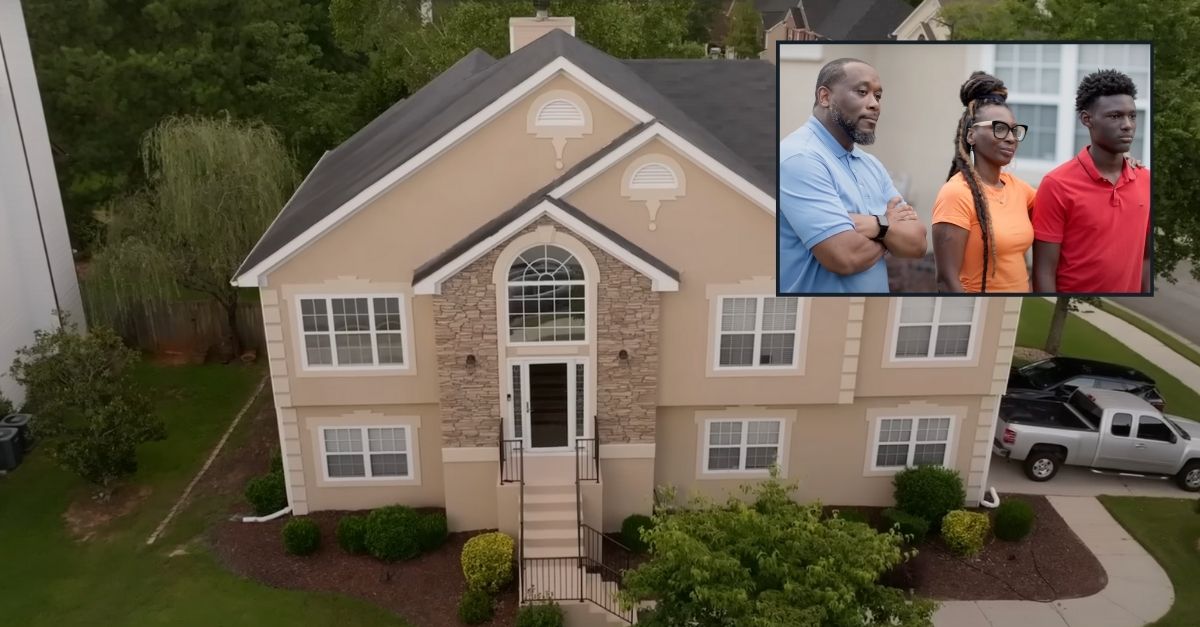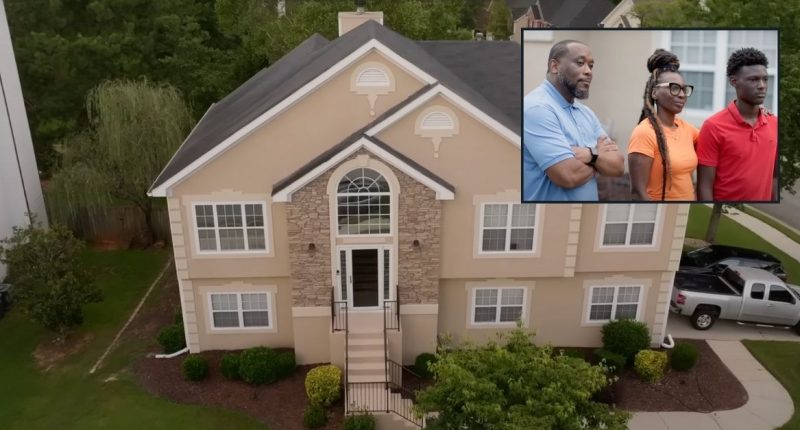
Background: The Martin-Cliatt family home in Atlanta, Georgia (Institute for Justice). Inset, left to right: Hilliard Toi Cliatt, Curtrina Martin, Martin’s son Gabe (Institute for Justice).
The Supreme Court issued an order late Monday that granted fast-track review in a case about whether a Georgia family can sue the federal government over their home being mistakenly raided by an FBI SWAT team.
In the predawn hours of Oct. 18, 2017, a team of six unidentified FBI agents set out to execute a “no-knock” arrest warrant on 3741 Landau Lane, SW, Atlanta, Georgia 30331. The raid was part of the FBI’s “Operation Red Tape,” an initiative to combat gang violence in Georgia that began in 2015. FBI Special Agent Lawrence Guerra led the Special Weapons and Tactics (“SWAT”) team that was tasked with executing the warrant.
The target address was reportedly the home of Jospeh Riley, a violent gang member. In preparation for the warrant execution, the SWAT team reviewed photographs of Riley and of 3741 Landau Lane, as well as an overhead map image of the neighborhood and directions to the of the residence. Guerra also conducted drive-by surveillance of the home and then documented details he believed were unique to the house, including the color and style of the house, its position on a corner lot, the presence of a large tree in the front yard, and the house number’s appearing on a small mailbox and as opposed to the front of the house.
Later, Guerra attended an operational briefing regarding the warrant execution at which he viewed several photographs of Riley and 3741 Landau Lane.
On the day of the warrant execution, Guerra and another agent conducted pre-raid drive-by of 3741 Landau Lane at a time when it was dark outside. Guerra used his personal GPS device to navigate to 3741 Landau Lane, but although Guerra put the correct address into the device, the GPS directed the officers instead to 3756 Denville Trace. That address was approximately 436 feet from 3741 Landau Lane, and faces Landau Lane.
Guerra did not notice the error and believed he was at 3741 Landau Lane. The Denville Trace house was the same color and style, also had a side-entry garage and a large tree, along with mailbox-mounted house numbers. At 3:30 a.m., the SWAT team dressed in full tactical gear and, armed with rifles and handguns, surrounded the home on Denville Trace. Guerra knocked and announced the presence of law enforcement and another agent set off a flash-bang — a nonlethal stun grenade — at the entrance as the team entered the home.
Curtrina Martin, Hilliard Toi Cliatt, and Martin’s son Gabe, who was then 7 years old, live in the home on Denville Trace. The couple hid in the bedroom closet during the raid, thinking that their home was being burglarized. A SWAT team member located the pair, dragged Cliatt onto the bedroom floor with guns pointed at him, and handcuffed him. Martin fell while in the closet and another SWAT team member pointed a gun in her face while yelling at her to keep her hands up. Gabe was separated from both adults while the team executed the warrant.
Guerra then entered the bedroom and realized that neither person. matched the photographs he had seen of Riley, and asked Cliatt for his name and address. At the same time, another agent noticed that a piece of mail left in the home had a different address than the target of the raid and notified Guerra that the team was at the wrong address. Guerra immediately ended the raid and an agent lifted Cliatt off the ground and uncuffed him. Guerra told Cliatt that he would come back later and explain what happened, and the agents left the house.
The SWAT team then executed the warrant at the intended location and arrested Riley as planned. Following the arrest, Guerra returned to the home of Martin and Cliatt, apologized to them, documented the damages caused by the mistaken raid, provided them with the contact information for his supervisor, and advised them that the FBI would handle the damage repairs.
Martin and Cliatt, represented by advocacy group The Institute for Justice (IJ), filed a lawsuit in Georgia against the federal government for a variety of state law claims, including false arrest, negligence, false imprisonment, and assault and battery. Typically, the federal government is immune from lawsuits, but the Federal Tort Claims Act (FTCA) waives that immunity if the lawsuit is against a federal employee for a wrongful act if that same individual could be held liable under the same circumstances in the state where the acts occurred.
Under the FTCA, though, there is an exception for state-law claims that stem from a government official’s performance of a discretionary duty that advances federal policy. The plaintiffs argued that there is no federal policy advanced by raiding the wrong house, and that the discretionary function exception should not apply in their case.
The district court ruled that Guerra is protected from the lawsuit based on qualified immunity and dismissed the claims against him. On appeal, Martin and Cliatt argued that this ruling had been incorrect, because Guerra’s mistaken execution of the search warrant was not a reasonable mistake and, therefore, his conduct violated the Fourth Amendment. Because it was undisputed that Guerra was acting within his discretionary authority, the court confined its decision to whether his actions violated clearly established law. The U.S. Court of Appeals for the 11th Circuit ultimately agreed with the district court and upheld the dismissal of Martin and Cliatt’s claims.
The 11th Circuit also took the unusual position that the lawsuit was barred by the supremacy clause of the United States Constitution.
The family appealed to the Supreme Court, which has now agreed to decide whether their claims are barred by the Constitution’s supremacy clause and to decide the applicability of the “discretionary function” exception. The case has been fast-tracked for oral argument and is expected to be heard during the current term.
“What happened to us was deeply unjust, and I’m relieved that the Supreme Court is taking up our fight for justice and accountability,” said Martin in a statement. “Congress wanted people in our unfortunate position to have the right to sue. When the government harms innocent people, it has a responsibility to make things right.”
“When police — including the FBI — raid the wrong house, they must be held responsible for the damages,” said IJ senior attorney Anya Bidwell. “The 11th Circuit let the government off the hook in this case, and we are hopeful that the Supreme Court will do the right thing and ensure that Americans can feel secure in their own homes.”









